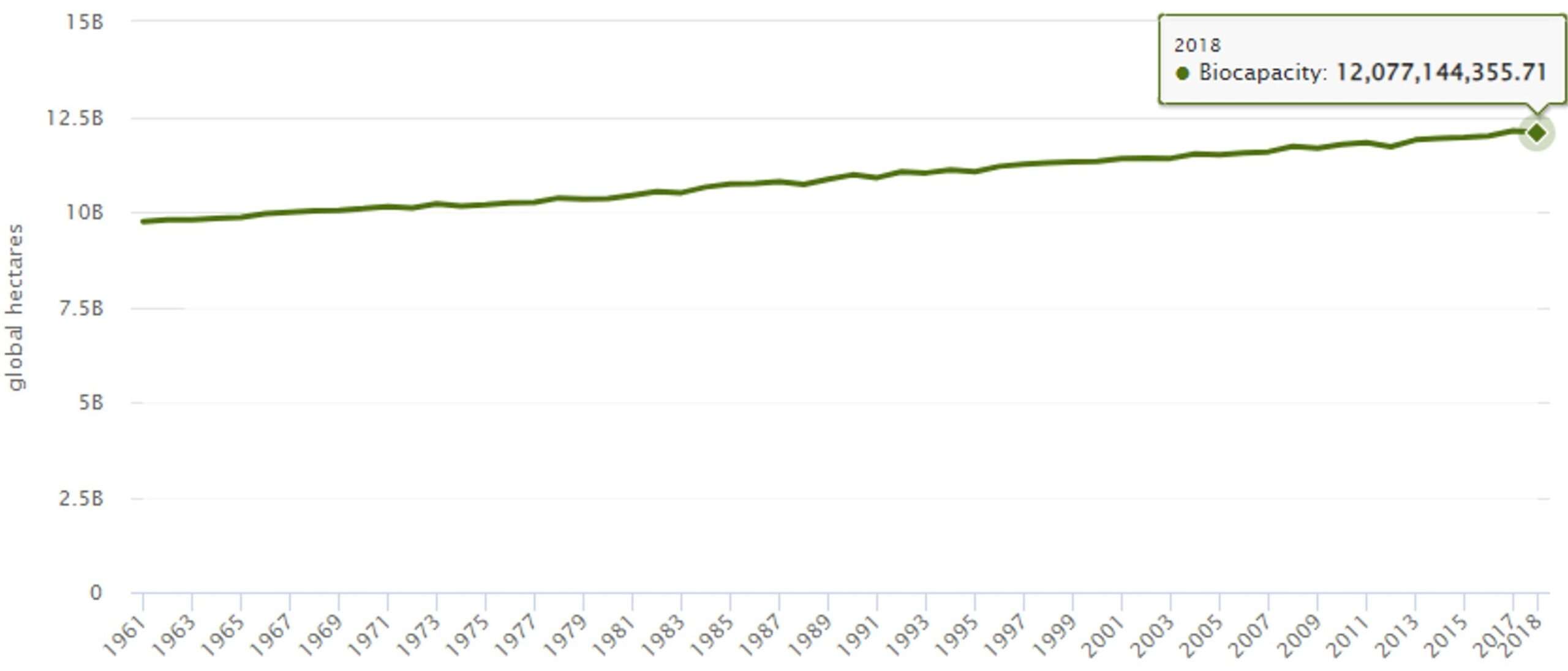
Despite several problems, increasing awareness and new strategies for protecting resources and improving people’s lives are leading to progress in many areas. The top 10 world’s most important environmental progress are reviewed and discussed here with relevant examples.
1. Increasing Global Biocapacity
As per the Global Footprint Network, the productivity of productive resources has increased over the last five decades. The increasing rate has been accelerated in two decades. The global biocapacity has reached over 12 billion global hectares. The increase in productivity is because of advancement and efficient use of resources in the agricultural and industrial sectors. However, per capita global biocapacity has remained constant for the last decade due to population growth. At present global biocapacity per capita is 1.6 global hectares.

2. Decreasing population growth rate and pollution
Many cities in the world are cleaner and much more liveable now than a decade ago, and as a consequence health and longevity have improved sharply. The world’s population is about to stabilize due to increased social security, education, and democracy. For example, the average number of children born per woman has decreased to 2.33 in India. With this, India’s population will stabilize at 1.67 billion in 2050.
3. Clinical development and human health
The incidence of life-threatening infectious diseases has decreased sharply in most countries during the past century, while life expectancies have increased. For example, Smallpox has been completely eradicated and polio has been defeated except in a few countries. Since more people have gained access to improved water supplies and modern sanitation. Despite population growth, the number of people facing food insecurity and chronic hunger has declined over the last two decades.
4. Renewable Energy
There has been dramatic and surprising progress in the transition to renewable energy sources. Growth and efficiency improvements in wind, solar, and biomass energy are beginning to reduce dependence on fossil fuels. The cost of solar power has dropped, and in many places, solar energy costs are the same as conventional electricity over time. Solar and wind power are far cheaper, easier, and faster to install than nuclear power or new coal plants. The world has installed more than 500 GW of solar capacity in the last ten years and it’s in working condition.
5. Information and Education
The new ideas, technologies, and strategies, expanding access to knowledge are essential for solving many environmental issues. The increased speed at which information moves offers unprecedented opportunities for sharing ideas. At the same time, literacy and access to education are expanding in most regions of the world. The rapid exchange of information on the Internet also makes it easier to raise global awareness of environmental problems. Expanding education for girls is a primary driver for declining birth rates worldwide. Therefore, education and information are considered the top 10 world’s most important environmental progress.
6. Conservation of Forests and Nature Preserves
The rate of deforestation has declined over the last two decades due to environmental awareness among common people. Naturalness and protected areas have increased dramatically over the past few decades. The protection of ecologically sensitive zones remains uneven, and some areas’ protection is only on paper. Still, this is dramatic progress in biodiversity protection.
7. Protection of Marine Resources
Although marine resources continue to be badly overexploited, many countries are gradually beginning to acknowledge the problem and find solutions. Now we have more marine protected areas and improved fish monitoring that provide opportunities for sustainable management. Protecting fish nurseries is a new approach to sustaining ocean ecosystems and those who rely on them.
8. Increase in water use efficiency
An above 9% increase has been observed in water use efficiency in all sectors since 2015. This is possible due to advancements in irrigation and awareness amongst the public about the value of water. There has been an improvement of 15% in the industrial sector and 8% in the agricultural. This is due to the adoption of less water-intensive technologies and methods, as well as the recycling of wastewater. Additionally, the development of irrigation tools and techniques, such as drip irrigation, sprinklers, airdrop, multi-door systems, and underground irrigation, has contributed to the reduction of water waste.
9. The changing role of women
Now women have started contributing more to societal responsibility than earlier. Women are relatively free from the responsibilities of taking care of more babies due to a lower total fertility rate (TFR) than a decade ago (2.530 in 2012 to 2.428 in 2022). In addition, women have started enjoying more social and professional life. This is possible due to the increase in safety and gender equality in most of the societies in the world. Many acts and initiatives have been taken to empower women in all sectors. For example, the right to education, advancing gender equality, women’s empowerment, etc.
10. Smartphone revolution
The revolution of smartphones plays a vital role in solving many environmental challenges including management and monitoring of the environment. This is why the smartphone revolution is in the top 10 world’s most important environmental progress. In the last ten years, the youth approaches have drastically changed and shifted to greener than ever before. For example, the paper requirement for the printing of bills is decreasing due to the extensive use of e-bills and payments. The current youth are more aware of their surroundings and their limitations. Due to more awareness among the people, many environmental challenges have been solved / under the pipe.

